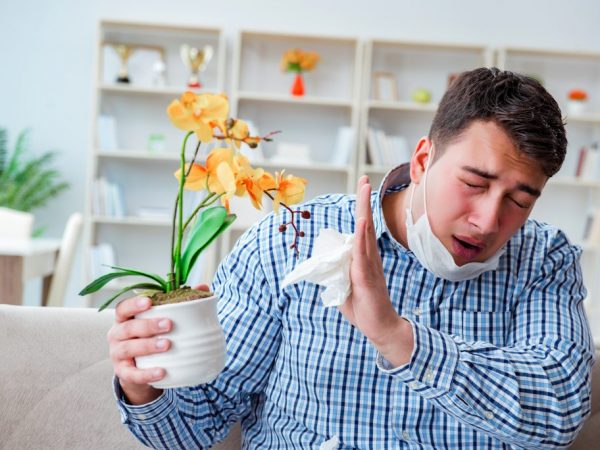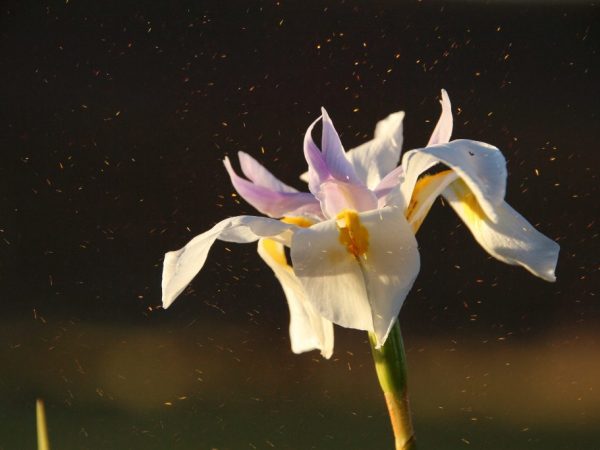Does the orchid cause allergies?
Plant pollen, especially indoor pollen, is a strong allergen for people with hypersensitivity. Orchid allergy is a rare occurrence; the flower itself is not considered an irritant. The orchid is allergic only in rare cases, often due to concentrated treatments.

Does the orchid cause allergies?
How allergenic the orchid is
An allergy to an orchid can be, but in exceptional cases.
Orchid is one of the types of indoor plants that only rarely causes allergic reactions. Therefore, even those suffering from seasonal rhinitis symptoms decorate their homes with an exotic flower.
The orchid causes allergies in owners, who often suffer from viral and bacterial infections, sensitive to the sap in the stem of the plant.
Allergy Causes
Basically, an allergic reaction is caused not by a flower, but by substances that are used to care for the crop. But if a person's body is greatly weakened, then an allergy will appear on the plant itself.
It is possible to determine if there is a reaction to a flower only if the symptoms appeared after contact with the plant. Also, the causes of allergies include:
- genetic predisposition;
- individual intolerance.
Allergy is an immunopathological process, which is expressed by the hypersensitivity of the body's immune system upon contact with an allergen. In the case of an orchid, pollen and plant sap can cause allergies.
Experts believe that the risk of hypersensitivity to the flower is more pronounced:
- The child has;
- in an adult who is taking medication;
- for allergy sufferers;
- with pathologies of the nervous and endocrine system.
Often it is the child who is allergic to the orchid, but only with repeated contact. First, sensitization or specific sensitivity is formed.
Symptoms

Orchid has a negative effect on many
Symptoms appear differently in each person. It depends on the tolerance of the body to various stimuli. The main symptoms of an orchid allergy:
- frequent headaches
- rhinitis, often occurs with tearing;
- redness of the eyes;
- bronchospasm, which causes a sore throat;
- tingling in the lips;
- rash, spots.
Some patients also have symptoms such as congestion in the ears and a rise in body temperature. If contact with the stimulus is discontinued, then the patient feels a noticeable improvement.
With bronchospasm, symptoms are observed:
- dizziness;
- frequent shortness of breath;
- difficulty breathing;
- feeling short of breath;
- dry cough or wheezing.
An allergic culture also causes blisters on the skin, which cause itching and swelling. It lasts a couple of hours, progresses with an increase in temperature and an increase in the area of the infected area.
Treatment
The main thing in treatment is the elimination of the allergen or contact with it. If an allergic reaction has led to complex consequences, you should start taking medications: Diazolin, Suprastin, Tavegil or Peritol.
Some experts recommend flushing the nasal mucous membranes with saline to combat rhinitis. In the early stages, the immune system is strengthened using allergen-specific immunotherapy. The causative allergen is introduced into the body in the form of a specially prepared preparation.
To combat a runny nose, drugs are taken:
- Avamis;
- Fexofenadine;
- Claritin.
They can be taken by both children and adults. And the drug Diphenhydramine is prescribed if a person has itching or sneezing. To remove puffiness, steroid pills are used.
It will take about 14 days to fully recover. Also, for treatment, experts suggest going on a small diet for these days. It excludes foods that often provoke adverse immunological reactions:
- oranges, tangerines;
- all kinds of nuts;
- strawberries, strawberries.
You should also give up hot spices and fried foods.
For the treatment and even prevention of such diseases, antihistamines are used. For symptoms associated with the eyes, use:
- Patanol;
- Backorder;
- Optivar.
Also, to get rid of the symptoms of orchid allergy, traditional medicine is also used - chamomile tincture. It is poured with boiling water and kept for 20-30 minutes. Take 2-3 tbsp. spoons for a day.
Before using any of these drugs, you need to consult your doctor.
Prophylaxis
For prevention, it is worth following the recommendations:
- do not place a flower in the bedroom or in the nursery;
- carry out regular wet cleaning;
- ventilate the room every day;
- do not use chemical fertilizers for the plant;
- when carrying out feeding, be sure to wear gloves and a respirator.
In the room where there is a flower pot, you should not turn on the split system, because phytoncides will reach their objects faster with air. You need to purchase an air humidifier in the apartment, which will eliminate dryness, which is one of the reasons for the transfer of viruses and allergens.
To reduce sensitivity to viruses and allergens, experts recommend strengthening your immunity. Monitor your diet and lifestyle. For pollen that gets from the street into the apartment, use damp gauze. It is folded several times and hung on the window. When it dries, sprinkle with water again.
Conclusion
Orchid allergies do happen, but are rare. When treating, first of all, you should consult a specialist.


